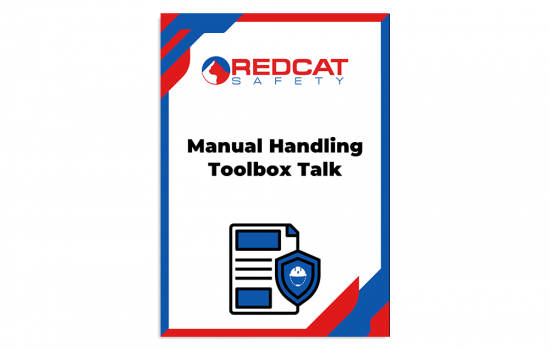About this Manual Handling Toolbox Talk
This manual handling toolbox talk can help you train workers and enable your business to provide a safe working environment and safe systems of work.
The toolbox talk provides information on how to identify hazardous manual tasks, assess the risk factors and determine appropriate control measures.
What is Manual Handling?
Manual handling can be described as the use of force exerted by a person to lift, lower, push, pull, carry or otherwise move, hold or restrain any animate or inanimate object.
Manual handling is the cause of many workplace manual handling injuries, particularly musculoskeletal disorders (MSD’s) and repetitive strain injuries.
Safe manual handling refers to the methods used to safely move or lift objects by hand. There are many potential hazards when performing manual handling tasks and these hazards can lead to serious injuries, including back pain, muscle strains, and hernias. To reduce the risk of injury, it is important to use safe manual handling techniques.
Guidelines for Safe Manual Handling
No person should ever attempt to lift any object beyond their lifting capacity. If an object appears to be too heavy, seek assistance or use a mechanical lifting device such as a pallet jack or forklift.

When lifting an object, follow these simple guidelines to avoid injuries.
- Ensure that you can gain clear access to the object to be lifted.
- Get a good stable footing, particularly with heavy objects.
- Place your feet about shoulder-width apart in a comfortably balanced position, close to the load to be lifted.
- Bend at the knees and grasp the object for safe lifting.
- Maintain a straight back—your back should never be bent.
- Ensure a secure grip of the object using the palms of your hands, not just your fingers; use gloves if the object has sharp edges.
- Lift the object gradually by straightening your legs and letting your leg muscles, not your lower back, do the work.
- Do not twist your body; if you must turn, move your feet to re-position the object.
- Carry the object close to your body and ensure you can clearly see where you are going.
- When lowering the object, keep your back straight, maintain a good grip and be careful not to jam your fingers.
A typical workplace will require many different tasks, and a great deal of these will involve manual handling. It is therefore essential that our bodies are prepared for these situations.
Flexibility is one of the key factors in helping to reduce muscle strain during manual handling. As such, it is recommended that all personnel undertake stretching exercises before manual handling.
Why Become a Member of Redcat Safety and Download this Manual Handling Toolbox Talk?
- This toolbox talk on manual handling can raise awareness about the potential risks and hazards associated with improper lifting, carrying, pushing, or pulling of objects.
- Employees can gain a better understanding of the risks of musculoskeletal injuries and the importance of proper manual handling techniques.
After downloading this manual handling toolbox talk you will be able to:
- Very easily edit and customize the template to create your own safety toolbox talk.
- Apply your own style, format and brand to the toolbox talk.
- Use it in any industry or sector regardless of size or type of organization.
Availability and Use of this Manual Handling Toolbox Talk
- This safety toolbox talk template is accessible to you right now by clicking the ‘Become a Member Now’ button.
- The toolbox talk will be delivered to you in fully editable Microsoft Word format for immediate and full use in your business.
- There are no membership auto-renewals, contracts or ongoing costs.

If you can find HSEQ resources that are of better value than what your Redcat Safety Membership offers, we will REFUND YOU double the cost of your membership.

